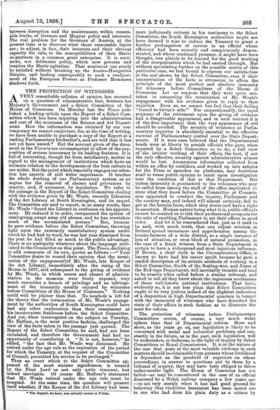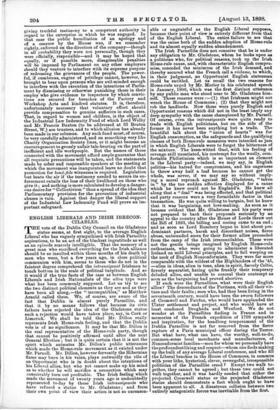THE PROTECTION OF WITNESSES. A VERY remarkable collision of opinion has
occurred on a. question of administrative fact, between her Majesty's Government and a Select Committee of the House of Commons. On Monday last the Times pub- lished a leading article upon the Report of a Select Com- mittee which has been inquiring into the administration and cost of the museums of the Science and Art Depart- ment. How the information was obtained by our con- temporary we cannot conjecture, for, at the time of writing, we have been unable to purchase a copy of the Report at a leading Parliamentary bookseller's, and are told that it has not yet been issued.* But the account given of the docu- ment in the Times is too circumstantial to allow of the sup- position of serious inaccuracy in its leading features. It is full of interesting, though far from satisfactory, matter in regard to the management of institutions which have an intimate relation to the development of the best culture in our midst. But the point which especially engages our atten- tion has aspects of still wider importance. It touches the whole working of our Parliamentary system as an engine for the removal of abuses and grievances by inquiry, and, if necessary, by legislation. We refer to the passage in the Report of the Select Committee dealing with the evidence given by Mr. Weale, recently Librarian of the Art Library at South Kensington, and its sequel. The Committee are said to report, in so many words, that Mr. Weale "found the Library in confusion on his appoint- ment. He reduced it to order, reorganised the system of cataloguing, swept away old abuses, and he has overtaken much of the accumulated arrears." But, because he gave evidence before the Select Committee, throwing light upon the extremely unsatisfactory system under which he had had to work, he was last year dismissed from the post he had filled so much to the public advantage. There is no ambiguity whatever about the language attri- buted to the Committee on this point. The Times, declining to add comments of its own, quotes as follows :—" Your Committee desire to record their opinion that the termi- nation of the engagementr.of Mr. Weale, late Keeper of the Art Library, immediately after the rising of the House in 1897, and subsequent to the giving of evidence by Mr. Weale, in which errors and abuses of adminis- tration in the museum were freely exposed, very much resembles a breach of privilege and an infringe- ment of the immunity usually enjoyed by witnesses before Committees of the House of Commons." Nothing could well be plainer than that. No loophole ie left for the theory that the termination of Mr. Weale's engage- ment by the authorities of South Kensington could have had any other explanation than their resentment at his inconvenient frankness before the Select Committee. And yet, when interrogated on the subject on Tuesday, Mr. Balfour, in the most positive fashion, challenged the view of the facts taken in the passage just quoted. The Report of the Select Committee, he said, had not been circulated, and therefore the Government had had no opportunity of considering it. " It is not, however," he added, " the fact that Mr. Weale was dismissed. He retired under the age rule at the expiration of the period for which the Treasury, at the request of the Committee of Council, permitted his service to be prolonged." Thus an event which to the Select Committee ap- peared of the most sinister significance, is treated by the First Lord as not only quite innocent, but indeed inevitable. Of course Mr. Balfour's statement that Mr. Weale retired under the age rule must be accepted. At the same time, the question will present itself whether, if the Keeper of the Art Library had been
• The Report, we hear, was actually issued on Friday.
more judiciously reticent in his testimony to the Select Committee, the South Kensington authorities might not have deemed it wise to induce the Treasury to grant a further prolongation of service to an official whose efficiency had been recently and conspicuously demon- strated, and whose continued presence, it might have been thought, was plainly to be desired for the good working of the reorganisation which he had carried through. But without speculating further on the possible merits of this particular case, we feel bound to express our satisfaction at the zeal shown by the Select Committee, even if their interpretation of the facts is erroneous, to affirm the principle of the most perfect and absolute immunity for witnesses before Committees of the House of Commons. Let us suppose that they were quite mis- taken in connecting the termination of Mr. Weale's engagement with his evidence given in reply to their inquiries. Even so, we cannot but feel that their failing "leaned to virtue's side." For unquestionably, the rapid sequence of the retirement upon the giving of evidence had a disagreeable appearance, and in such matters it is of the first importance that the very appearance of evil should be avoided. The security of witnesses at Parlia- mentary inquiries is absolutely essential to the effective exercise of Parliamentary control over the State Depart.. ments. If it were once believed that the Departmental heads were at liberty to punish officials who gave, when required by a Select Committee so to do, a full view of the interior working of their offices, the best, if not the only effective, security against administrative abuses would be lost. Anonymous information collected from within an office by outsiders, and worked up into articles for the Press or speeches on platforms, may doubtless avail to rouse public opinion to insist upon investigation into the condition of this or that Department. But unless immunity is guaranteed to the witnesses who may be called from among the staff of the office implicated to state what they know before the Committee or Commis- sion appointed to conduct the inquiry, Parliament and the country may, and indeed will almost certainly, fail to get at the bottom facts, which they desire and have a right to ascertain. Human nature being what it is, public officials cannot be counted on to risk their professional prospects for the sake of enabling Parliament to set their offices in good order. And let it be remembered that, just as it used to be said, with much truth, that one unjust eviction in Ireland spread uneasiness and apprehension among the tenant-farmers of a wide district, so a single instance of loss of situation, or even block of natural promotion, in the case of a frank witness from a State Department is certain to have a widespread and most injurious influence. If Brown, a chief clerk in the Circumlocution Office, is known to have had his career spoilt because he gave a candid description of its artistic methods of working to a Select Committee, Smith of the Sealing-wax, and Jones of the Red-tape Department, will inevitably tremble and tend to be evasive when called before a similar tribunal, and asked to tell all they know about the ingenious mechanism of those well-known national institutions. That being evidently so, it is not less plain that Select Committees ought to be very jealous indeed of the slightest indication of a disposition in high Departmental quarters to tamper with the immunity of witnesses who have described the state of their offices in such fashion as to illustrate the need for reform.
The protection of witnesses before Parliamentary Committees covers, of course, a very much wider sphere than that of Departmental reform. likely and more, as the years go on, our legislation is likely to be concerned with social and industrial problems, and con- stantly in the future, as in the past, such legislation will be undertaken, or forborne, in the light of inquiry by Select Committees or Royal Commissions. It is in the nature of the case that some of the most valuable evidence in such matters should be obtainable from persons whose livelihood is dependent on the goodwill of superiors on whose proceedings, in answer to questions put to them by a tribunal of inquiry, they may have been obliged to throw unfavourable light. The House of Commons has not failed—as may be remembered in the case of an official dismissed by a Welsh railway company a few years age —to act very sternly when it has had good ground for believing that vindictive treatment has been meted out to one who had done his plain duty as a citizen by giving truthful testimony to a competent authority in regard to the enterprise in which he was engaged. In that case the public humiliation of an apology and of a censure by the House was, if we remember rightly, enforced on the directors of the company—though in all probability they were not personally, though they were officially, responsible—and it may be hoped that equally, or if possible more, disagreeable penalties will be imposed by Parliament on any other employers should they venture to interfere with its supreme purpose of redressing the grievances of the people. The power- ful, if cumbrous, engine of privilege cannot, however, be brought to bear upon persons who are evil-minded enough to interfere with the execution of the intentions of Parlia- ment by dismissing or otherwise punishing those in their employ who give evidence to inspectors by which convic- tions are secured for breaches of the Factory and Workshop Acts and kindred statutes. It is, therefore, unfortunately necessary that voluntary effort should provide compensation to genuine sufferers in such cases. That, in regard to women and children, is the object of the Industrial Law Indemnity Fund of which Lord Welby and Mr. Francis Buxton (to be addressed at 33 Bruton Street, W.) are trustees, and to which allusion has already been made in our columns. Any such fund must, of course, be very carefully administered, and on something very like Charity Organisation Society lines, or it might become an encouragement to grossly unfair tale-bearing on the part of inefficient and idle workpeople. But the names of those connected with the movement afford ample guarantee that all requisite precautions will be taken, and the statements made by sober and responsible speakers at the meeting at which the movement was inaugurated leave no doubt that protection for bond filewitnesses is required. Legislation but beats the air if the testimony needed to secure its en- forcement entails the loss of their livelihood on those who give it ; and nothing is more calculated to develop a danger- ous desire for " Collectivism " than a spread of the idea that Parliamentary provision for the prevention of industrial abuses is vain. Against that danger the liberal support of the Industrial Law Indemnity Fund will prove an im- portant safeguard.



































 Previous page
Previous page